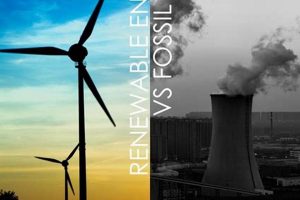
The Department of Energy (DOE) plays a critical role in powering the nation through its focus on energy independence, security, and technological innovation. This involves a diverse portfolio including research and development... Read more »

Non-renewable energy sources are geological deposits of organic materials formed over millions of years from decayed plants and animals subjected to intense heat and pressure. Coal, petroleum, and natural gas are prime... Read more »

Energy resources are categorized as either renewable or nonrenewable. Renewable resources, such as solar, wind, and hydro, are replenished naturally at a rate comparable to or faster than their consumption. Nonrenewable resources,... Read more »

Conventional energy sources derived from geological deposits of organic matter versus energy generated from naturally replenishing resources represent a fundamental dichotomy in modern power generation. The former relies on finite reserves of... Read more »

Government financial support, including direct payments, tax breaks, and price controls, often targets specific energy sources. These supports can artificially lower the cost of production or consumption for either conventional fuels derived... Read more »

Shifting power generation from sources like coal, oil, and natural gas to sources like solar, wind, hydro, and geothermal involves fundamental changes in how energy is harnessed and delivered. For example, instead... Read more »

Government financial support for energy production in the United States takes two primary forms: assistance for established industries based on fossil fuels (coal, oil, and natural gas) and incentives for emerging renewable... Read more »

Coal, oil, and natural gas are formed from the remains of ancient plants and animals over millions of years. This lengthy formation process makes these energy sources finite and incapable of replenishment... Read more »

A resource that replenishes naturally on a human timescale and can be utilized to generate power or propel vehicles falls under the classification of sustainable energy. Examples encompass solar radiation, wind power,... Read more »

Federally funded research and development efforts into energy sources encompass a wide range of resources, from conventional fossil fuels to advanced renewables like solar, wind, and geothermal. This research also explores innovative... Read more »


